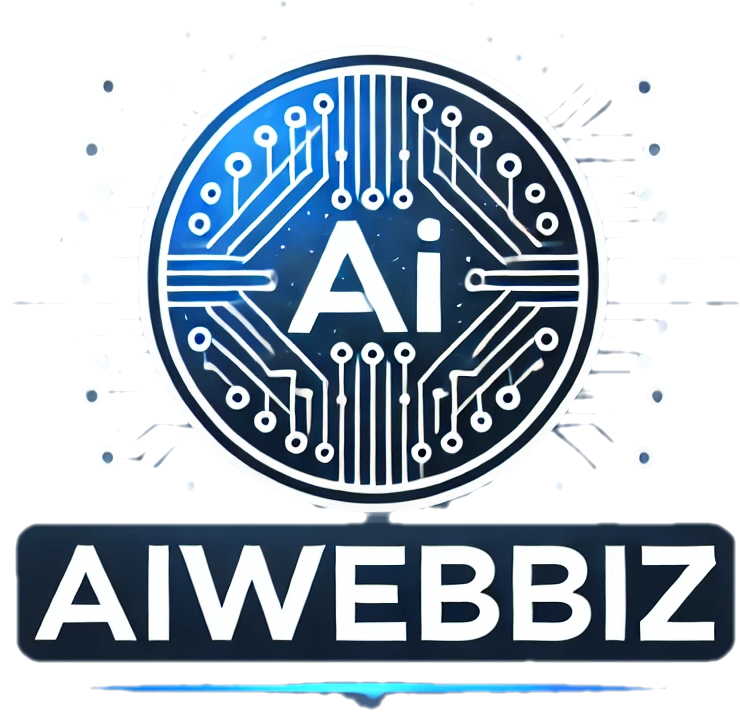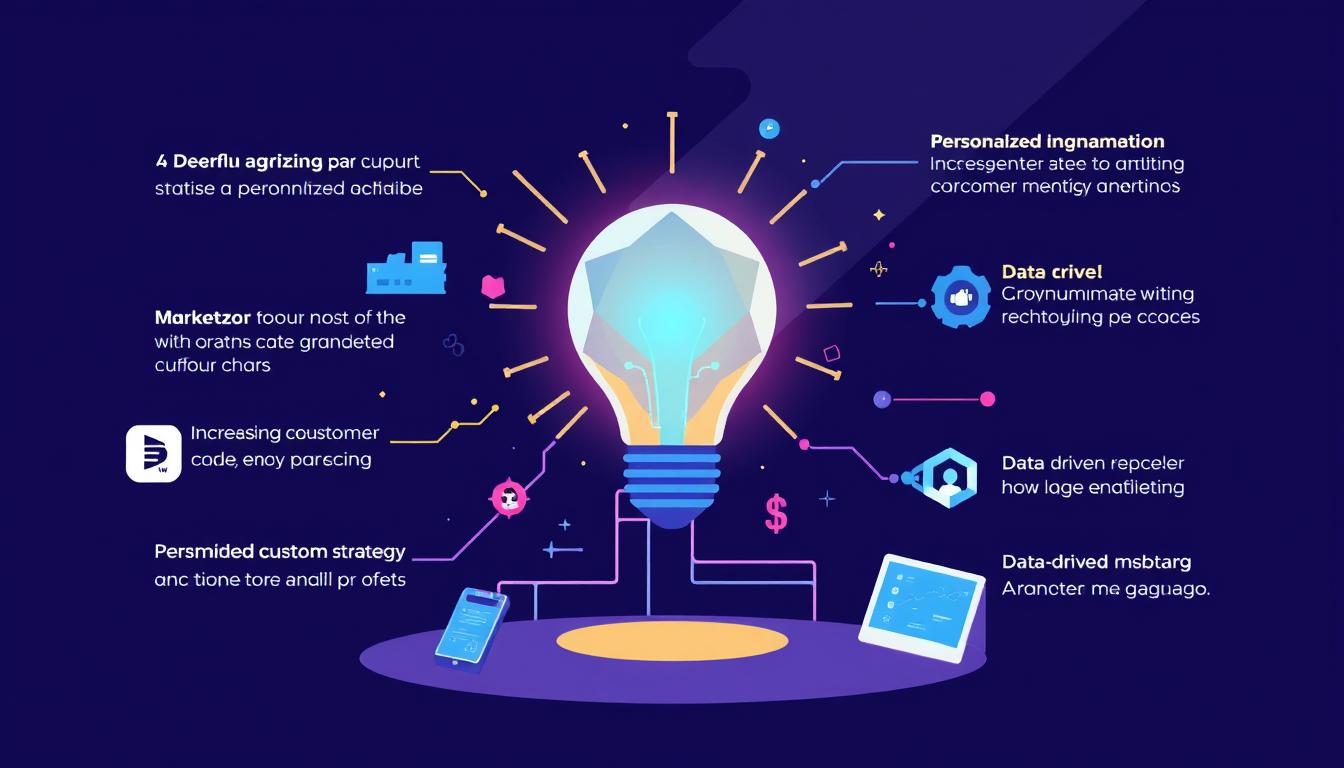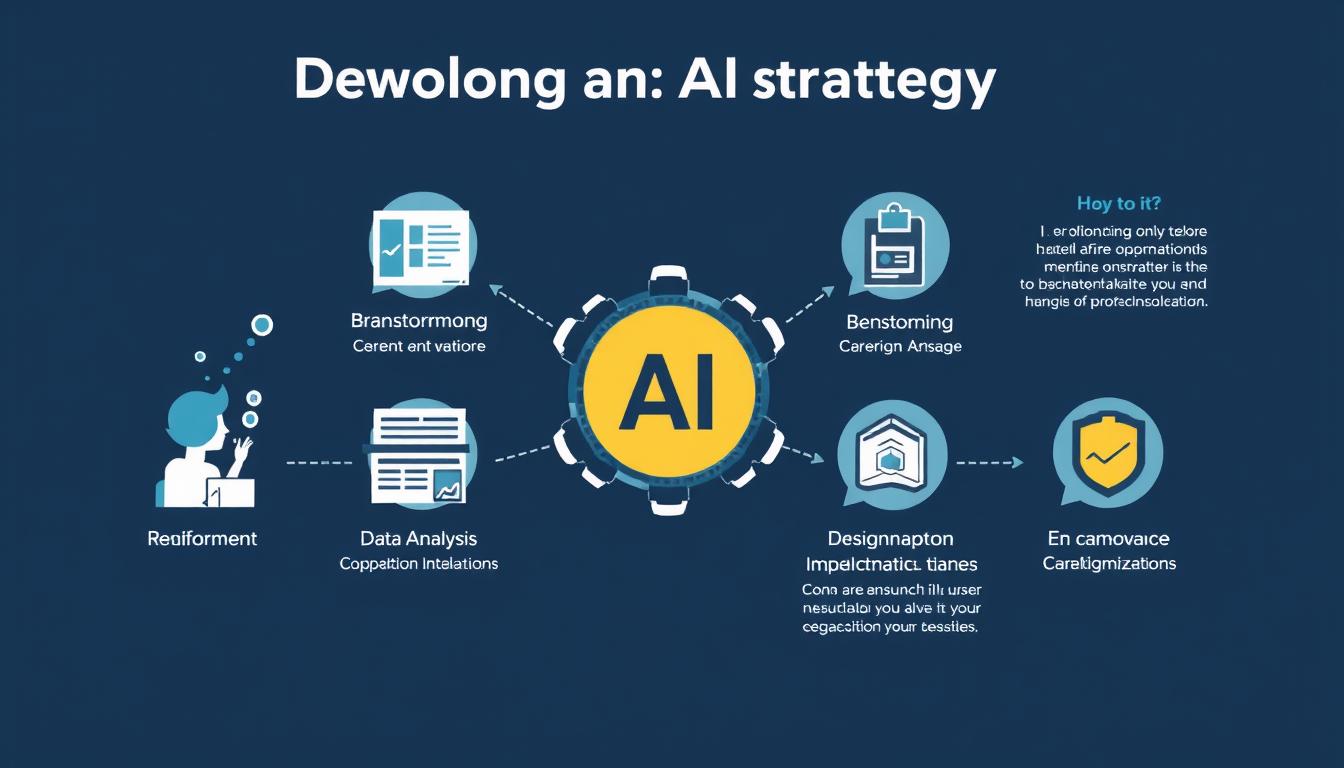In recent years, artificial intelligence has revolutionized numerous fields, and marketing is no exception.
By harnessing the power of AI, businesses can significantly enhance their marketing strategies, automate complex processes, and boost customer satisfaction. As we step into 2025, AI-driven marketing has become indispensable for startups aiming to stand out in crowded markets.
This comprehensive guide will explore the transformative impact of AI on startup marketing strategies, offering actionable insights that don’t require extensive technical expertise.
Key Takeaways
- Understanding the role of AI in modern marketing for startups.
- Leveraging AI tools for personalization and customer engagement.
- Implementing AI-driven data analysis to optimize marketing efforts.
- Exploring essential AI marketing tools tailored for startups.
- Strategies for integrating AI into existing marketing frameworks.
The Evolution of AI in Startup Marketing
The evolution of AI in startup marketing has been nothing short of remarkable, changing the game for new businesses. Artificial intelligence technology is revolutionizing various aspects of marketing through process automation that was previously hugely manpower-reliant.
This transformation is making businesses leaner, maximizing performance, and gaining deeper insights into their customers’ behavior. AI has the potential to revolutionize marketing strategy by automating tasks, personalizing content, and providing real-time insights.
Current State of AI Marketing Technologies in 2025
In 2025, AI marketing technologies have matured to include advanced predictive analytics, natural language processing, computer vision, and autonomous campaign optimization that operate with minimal human oversight.
Today’s AI marketing platforms can process vast amounts of customer data in real-time, identifying patterns and insights that would be impossible for human marketers to discover manually. This capability allows businesses to stay ahead of the curve, making data-driven decisions that drive growth and customer engagement.
Why Startups Have a Unique Advantage with AI
Startups have a unique advantage with AI adoption as they typically lack the legacy systems and entrenched processes that can hinder implementation in larger organizations.
The agility and innovation-focused culture of startups makes them ideal environments for rapid AI integration, allowing them to leverage cutting-edge marketing technologies without extensive organizational change management. By adopting AI, startups can level the playing field against larger competitors, using data-driven strategies to identify and exploit market opportunities that might otherwise be missed.
Key Benefits of AI-Driven Marketing Strategies for Startups
The benefits of AI-driven marketing for startups are multifaceted, ranging from enhanced efficiency to data-driven decision-making. By leveraging AI in their marketing strategies, startups can gain a competitive edge in the market.
Enhanced Efficiency and Resource Optimization
AI-driven marketing strategies offer startups significant efficiency gains by automating tasks that would otherwise require substantial human resources, such as content scheduling, email marketing, and basic customer interactions. This resource optimization is particularly valuable for startups with limited budgets, as AI tools can perform the work of multiple marketing team members at a fraction of the cost while maintaining consistent quality.
Data-Driven Decision Making
The data-driven decision making enabled by AI marketing tools allows startups to base strategic choices on objective insights rather than intuition, reducing risk and improving marketing ROI. AI systems continuously analyze customer behavior patterns and market trends, providing startups with actionable insights that can inform product development, pricing strategies, and marketing messaging.
Scalability and Competitive Advantage
The scalability of AI marketing solutions means startups can easily handle growing customer bases and expanding marketing operations without proportional increases in team size or budget. Moreover, AI provides startups with a competitive advantage by enabling them to identify and target niche market segments, personalize customer experiences at scale, and respond to market changes more quickly than larger, less agile competitors.
Essential AI Marketing Tools for Startups in 2025

As we dive into 2025, startups are presented with a myriad of AI marketing tools that are revolutionizing the way they approach their marketing strategies. The AI marketing landscape offers a wide array of specialized tools designed to enhance every aspect of marketing operations.
Content Creation and Optimization Platforms
Content creation has become more sophisticated with AI-driven platforms that can generate high-quality, brand-aligned content across multiple formats, including blog posts, social media updates, and email campaigns.
These content creation platforms incorporate advanced SEO optimization capabilities, ensuring that the content is structured to maximize search visibility while maintaining natural language patterns.
Customer Analytics and Predictive Tools
Customer analytics and predictive tools have become essential for startups, offering deep insights into customer behavior patterns and purchase likelihood.
These analytics platforms enable startups to develop targeted marketing strategies based on data-driven insights, improving customer engagement and conversion rates.
Automation and Workflow Management Solutions
Automation and workflow management solutions have transformed how marketing teams operate, creating seamless processes that connect content creation, distribution, and performance tracking.
These solutions enable startups to implement sophisticated multi-channel marketing strategies with minimal manual intervention, ensuring consistent messaging and timing across all customer touchpoints.
Implementing AI-Driven Marketing Strategies for Startups
For startups, adopting AI-driven marketing strategies can mean the difference between stagnation and rapid growth. To successfully integrate AI into their marketing efforts, startups must follow a systematic approach.
Step1: Assessing Your Current Marketing Infrastructure
Implementing AI-driven marketing strategies requires a thorough assessment of your startup’s current marketing infrastructure, including existing tools, data collection methods, and team capabilities. This initial assessment helps identify gaps and opportunities where AI can create the most significant impact.
Step2: Identifying High-Impact AI Implementation Areas
Identifying high-impact AI implementation areas involves analyzing your marketing funnel to determine where bottlenecks exist or where manual processes are consuming disproportionate resources. Many startups find that customer segmentation, content personalization, and campaign optimization offer the quickest returns on AI investment.
Step3: Building a Phased Implementation Roadmap
Building a phased implementation roadmap is crucial for success, as it allows for gradual integration of AI tools without overwhelming your team or disrupting existing marketing operations. A well-designed roadmap typically begins with simple automation tools before progressing to more sophisticated AI applications.
Step4: Measuring Success and Iterating
Measuring success requires establishing clear KPIs before implementation, such as engagement rates, conversion improvements, time savings, or lead quality enhancements that can be directly attributed to AI adoption. The implementation process should be iterative, with regular evaluation periods to assess performance and make necessary adjustments.
Some key considerations include:
- Ensuring that AI implementation aligns with overall business goals
- Providing adequate training to marketing teams to effectively use AI tools
- Continuously monitoring and adjusting AI strategies based on performance data
AI-Powered Customer Personalization Techniques
The advent of AI in marketing has paved the way for hyper-personalized customer experiences that were previously unimaginable. With AI, companies can now craft highly personalized user experiences by monitoring the behavior of each user, thereby increasing the likelihood of conversion and customer satisfaction.
Hyper-Personalized Content Delivery
Hyper-personalized content delivery systems analyze hundreds of data points about each customer to create truly individualized experiences. This includes website content, email messaging, product recommendations, and advertising. By dynamically adjusting content elements, tone, imagery, and offers based on real-time analysis of customer behavior patterns, businesses can significantly increase engagement and conversion rates.
| Personalization Aspect | Traditional Approach | AI-Powered Approach |
|---|---|---|
| Content Delivery | Generic content for broad audience segments | Individualized content based on user behavior and preferences |
| Email Messaging | Mass emails with minimal personalization | Personalized emails with dynamic content and offers |
| Product Recommendations | Based on broad demographic data | Based on individual user behavior and purchase history |
Behavioral Prediction and Proactive Engagement
AI systems can now anticipate customer needs and interests before customers themselves are consciously aware of them. Proactive engagement strategies leverage these predictive insights to initiate timely, relevant interactions that feel helpful rather than intrusive, creating positive brand associations and strengthening customer relationships.
Dynamic Customer Journey Mapping
Dynamic customer journey mapping has transformed how startups understand and optimize the customer experience. AI continuously analyzes touchpoints and identifies opportunities for personalization and improvement. These journey mapping tools can automatically detect when customers deviate from expected paths and trigger appropriate interventions, such as targeted content or special offers, to guide them back toward conversion.
By embracing AI-powered customer personalization techniques, businesses can significantly enhance customer experiences, driving loyalty and ultimately, revenue growth.
Leveraging AI for Data Analysis and Market Insights
The integration of AI in marketing has transformed data analysis, providing startups with real-time strategic intelligence. By leveraging AI-based techniques, marketers can now analyze vast amounts of data to gain valuable insights into customer behavior and preferences.
AI has revolutionized how startups analyze marketing data, transforming what was once a time-consuming, retrospective process into a proactive decision-making tool. With AI, startups can now process and analyze organized and unstructured data, including demographics, acquisition histories, social media usage, and website analytics.
Competitive Intelligence Automation
Competitive intelligence automation tools continuously monitor competitors’ social media activities, website changes, pricing strategies, and content marketing efforts. This provides startups with comprehensive insights without the need for dedicated research teams.
- Identify gaps in competitors’ offerings and messaging
- Highlight strategic opportunities to differentiate your startup
- Monitor competitors’ social media activities and content marketing efforts
Trend Forecasting and Opportunity Identification
Trend forecasting capabilities have become remarkably sophisticated, with AI systems analyzing search patterns, social media conversations, and industry publications to identify emerging trends before they become mainstream.
| Trend Forecasting Features | Benefits |
|---|---|
| Analyzing search patterns and social media conversations | Identify emerging trends early |
| Evaluating trend data against your startup’s capabilities | Recommend specific strategies for capitalizing on emerging market shifts |
Customer Sentiment Analysis and Brand Monitoring
Customer sentiment analysis tools monitor brand mentions across social media, review sites, forums, and other digital channels. This provides a nuanced understanding of how customers perceive your brand compared to competitors.
“The key to successful marketing is understanding your customer’s needs and preferences.”
By leveraging AI-driven data analysis and market insights, startups can make informed decisions, drive effective marketing strategies, and stay ahead of the competition.
Common Pitfalls to Avoid When Implementing AI Marketing
AI marketing can be a game-changer for startups, but only if they avoid common implementation mistakes. As AI continues to revolutionize marketing strategies, understanding the potential pitfalls is crucial for achieving desired business outcomes.
Over-Reliance on Automation Without Human Oversight
One of the most significant mistakes startups make is over-relying on automation without maintaining adequate human oversight. While AI excels at analyzing data and recognizing patterns, it lacks the emotional intelligence and cultural awareness that human marketers bring to strategy development and content creation. Regular monitoring and validation of AI-generated insights are essential to ensure they align with business objectives and market realities.
Neglecting Data Privacy and Ethical Considerations
Another critical pitfall is neglecting data privacy and ethical considerations. As AI relies heavily on data, startups must implement robust data protection measures and comply with regulations like GDPR. Transparency about how customer data is collected, stored, and used is vital for maintaining trust and avoiding legal issues.
Misalignment Between AI Initiatives and Business Goals
Misalignment between AI initiatives and business goals often occurs when startups implement AI tools without clearly defining how these technologies support broader strategic objectives. Every AI marketing strategy should be directly tied to specific business goals, such as increasing customer acquisition or improving retention. Ensuring alignment across departments is crucial for creating cohesive customer experiences.
Conclusion: Future-Proofing Your Startup with AI Marketing
As we look to the future of marketing, it’s clear that AI-driven strategies will play a crucial role in shaping the success of startups. The integration of AI in marketing is transforming the way businesses interact with customers, optimize operations, and drive results.
To future-proof your startup, it’s essential to adopt AI-driven marketing tools and develop a culture of continuous learning and adaptation. This involves leveraging AI for content creation, customer support, and campaign optimization to deliver hyper-personalized customer experiences.
By embracing AI marketing now and developing the organizational capabilities to leverage these tools effectively, your startup will be well-positioned to adapt to whatever technological advances the future brings, driving business growth and customer satisfaction.









Comments are closed